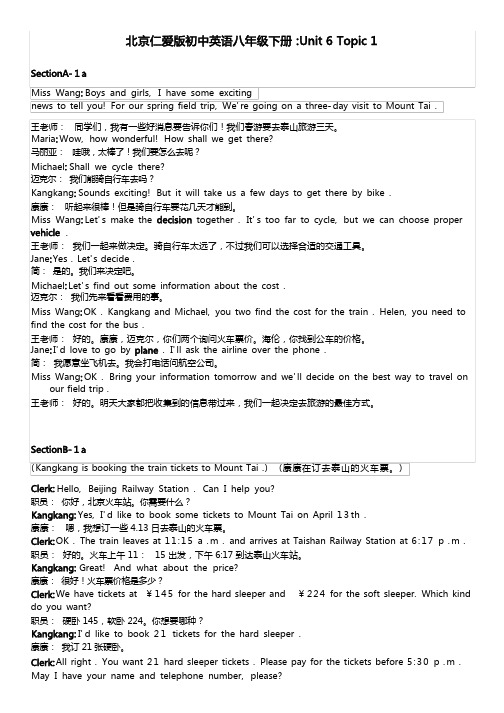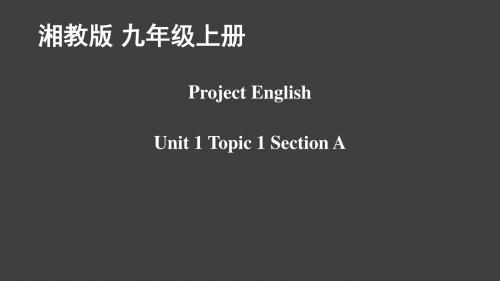仁爱九年级英语Unit 6 Topic 1 Section A
部编版2020九年级英语下册 Unit 6 重点词组与句型 (新版)仁爱版

Unit 6 Topic 1 短语及重点句型Section A1. would rather do sth. than (do) sth. 宁愿做某事也不愿做某事would rather not do sth. 宁愿不做某事2. be good at (doing) sth. 擅长与(做)某事be good for 对……有益3.No problem 没问题4. learn to do sth. 学做某事5.in one’s spare/ free time在某人的业余时间6. enjoy / like doing sth. 喜欢做某事I enjoy watching TV, especially quiz shows from which I can learn a lot.7.take part in 参加(活动)8.win a prize 获奖9. be tired of (doing) sth. 讨厌,对……感到厌烦10. a story with a sad end 一个以悲剧结尾的故事11. seem to do sth. 似乎seem + adj.It seems that +从句12. a story about the police against bad people一个关于警察同坏人作斗争的故事13. fall in love (with sb.) 爱上(某人)Section B14.in a tired voice 用一种疲惫的声音15.in surprise 惊讶地16.be interested in 对……感兴趣17. be / get ready to do sth. 准备好做某事be / get ready for sth. 为……做准备18.keep secrets 保守秘密19.be under the same star sign 属于相同的星座20.in total 总共21.depend on 取决于,依靠22.once upon a time 从前23. be angry at sth. 对某事生气be angry with sb. 对某人生气24. give sb. a sudden attack on the + 身体部位给某人的某个部位一个突然袭击25.fight back 还击,反击Section C26. pay attention to sth. 注意27. You are a lucky dog. 你是一个幸运的人28. Every dog has its day. 凡人皆有得意时29. on the one hand…, on the other hand… 一方面,另一方面30. stand for 代表,象征31. national flower 国花32. compare A with/ to B 比较A与B33. prefer A to B 比起B来,更喜欢ASection D34. have a huge influence on sth. 对……产生巨大的影响35. spend time (in) doing sth. 花……做某事36. be suitable for sb. 适合某人37. It’s a waste of time to watch TV, especially soap operas.看电视浪费时间,尤其是连续剧。
北京仁爱版初中英语八年级下册 Unit 6 Topic 1 课文翻译

Miss Wang Boys and girls,I have some excitingnews to tell you!For our spring field trip,We're going on a three-day visit to Mount Tai .王老师:同学们,我有一些好消息要告诉你们!我们春游要去泰山旅游三天。
Maria Wow,how wonderful!How shall we get there?马丽亚:哇哦,太棒了!我们要怎么去呢?Michael Shall we cycle there?迈克尔:我们能骑自行车去吗?Kangkang Sounds exciting!But it will take us a few days to get there by bike .康康:听起来很棒!但是骑自行车要花几天才能到。
Miss Wang Let's make the together .It's too far to cycle,but we can choose proper .王老师:我们一起来做决定。
骑自行车太远了,不过我们可以选择合适的交通工具。
Jane Yes . Let's decide .简:是的。
我们来决定吧。
Michael Let's find out some information about the cost .迈克尔:我们先来看看费用的事。
Miss Wang OK .Kangkang and Michael,you two find the cost for the train .Helen,you need to find the cost for the bus .王老师:好的。
康康,迈克尔,你们两个询问火车票价。
海伦,你找到公车的价格。
Jane I'd love to go by I'll ask the airline over the phone .简:Miss Wang OK .Bring your information tomorrow and we'll decide on the best way to travel on our field trip .王老师:好的。
仁爱英语九上同步练习U1T1Section A(含答案)

仁爱英语九年级上册同步练习Unit 1 Topic 1Section A一、选词填空,并用正确的形式improve, fun, take place, volunteer, bell1.I need some ___________ to help with the washing-up.2.The next meeting will _______________ on Thursday.3.He rang the _________ and waited for someone to answer the door.4.You could use the money for _____________ your home.5.The children were having so much _______. I didn’t want to call them inside.二、翻译句子1.见到了我的同学们,我感到很开心。
I am happy ______ _________ my classmates.2.你在暑假期间玩得开心吗?Did you have a good ___________ _____________?3.那里已经发生了巨大的变化。
__________ _____________ have taken place ____________.4.人太多了以至于我找不到一个好的拍照地点。
_______ ______ so many people ______ I couldn’t find a good place ____ ______ photos.5.为了提高我的英语,我去了一个暑期学校。
I _________ ________ _______ an English summer school ____ _________ my English.三、用have been to和have gone to的正确形式填空1.He ________________ Paris three times.2.--Where are the kids? --They ________________ play in the park.3.--Let’s take a walk in the park.--We ____________ there many times. Let’s walk along the river.4.--Hello, may I speak to Dr. Lee?--He isn’t in his office. He _________________ home.5.Those who ________________ Dalian all say it’s beautiful.四、阅读理解Some people think only school children do not agree with their parents, however, it is not true.Communication is a problem for parents and children of all ages. If it’s hard for you to communicate with your parents, don’t worry about it. Here are some advice for you to bridge the generation gap(消除代沟).Don’t argue with your parents. Don’t get to your parents when you are angry. Your parents probably won’t consider your ideas if you are shouting at them. And you can’t express yourself well if you are angry. Go to someplace to cool off. Make sure you understand why you are unhappy. Then think about what you want to say to your parents. If you don’t think yo can speak to them at the moment, try writing a letter.Try to reach a compromise(和解). Perhaps you and your parents disagree on something. You can keep your disagreement and try your best to accept each other. Michael’s mother didn’t agree with him about buying a motorcycle. They argued over it. But they finally came to a compromise. Michael bought the motorcycle, but only drove it on certain days.Of course, your parents might refuse to compromise on something. In these situations, it is especially important to show love and respect to them. Showing respect will keep your relationship strong.Talk about your values. The values of your parents are probably different from those of your own. Tell your parents what you care about, and why. Understanding your values might help them see your purposes in life.A good relationship with your parents can make you a better and happier person. It is worth having a try! ( )1.The passage tells us _______ have a communication problem.A.parents and their close friendsB.teachers and their studentsC.parents and children of all agesD.school kids and their parents( )2.Your parents probably won’t consider your ideas if you ______.A.write a letter to themB.don’t talk with them oftenC.express yourself wellD.don’t speak to them politely( )3.The underlined phrase “cool off” in the passage means ________.A.to get you quiet and relaxedB.to hide yourself quicklyC.to help make yourself happyD.to help you have a good rest( )4.If there is really a generation gap between you and your parents, you’d better _______.A.keep away from themB.have a talk with them oftenC.not talk to them any moreD.agree with them all the time( )5. What can we learn from the passage?A.There are so many serious problems in families today.B.Parents and children should not have a generation gap.C.Parents should show love and respect to their children.D. There are some good ways to bridge the generation gap.五、词语填空I took part 1.________ the winter camp at Willow Primary School on Saturday with my friends. There were many great 2._______________(activity) for us.3.______ Saturday morning, we had an art class at eight. Mr Black4.____________ (teach) us to draw cartoons. After that, at ten, we5.__________(sing) English songs with Miss Green in the music class. We had lunch at twelve. We had beef, hamburgers6.______ orange juice. There were also noodles and sandwiches. After lunch, we went to the playground and learned some kung fu with our PE teacher Mr Fred. Then, it was teatime. We had some7._________(snack), and we drank tea or coffee with our teachers. At five in the afternoon, we cooked our dinner8.__________ the help of Miss Reed. It was9. ____________(interest).10.___________ great the winter camp was!参考答案一、1.volunteers 2.take place 3.bell 4. improving 5.fun二、1.to see/meet 2.summer holiday/vacation 3.Great changes; there4.There were; that; to take5.have gone to; to improve三、1. has been to 2.have gone to 3.have been 4.has gone 5.have gone to四、1.C 2.D 3.A 4.B 5.D五、1.in 2.activities 3.on 4. taught 5.sang 6.and 7.snacks 8.with9.interesting 10.How。
仁爱英语九年级教材讲解Unit1知识点击

Unit 1 Topic 1 Section ANew wordsNew phrasesUseful expressions知识点击1.Rita,you have just come back from your hometown.丽塔,你刚从老家回来。
该句使用的是现在完成时的肯定式,由“主语+have/has+动词的过去分词+其他”构成。
现在完成时表示过去发生的某一动作对现在造成的影响或结果。
其结构是:“助动词have/has+动词的过去分词”。
动词过去分词的构成:规则变化跟动词的过去式一样,不规则变化见教材后面的附表。
【拓展】(1)否定句:“主语+haven’t hasn't+动词的过去分词+其他”.如:Tom hasn't seen this film.汤姆没看过这部电影。
(2)一般疑问句:“Have/Has+主语+动词的过去分词+其他?”。
如:Have you cleaned the classroom?你打扫教室了吗?(3)特殊疑问句:“特殊疑问词+have/has+主语+动词的过去分词+其他?”。
如:Where has John gone?约翰去哪儿了?,2.Great changes have taken place there and my hometown has become more and more beautiful.那里发生了巨大变化,我的家乡变得越来越美。
take place意为“(尤指根据安排或计划)发生,进行”。
如:The art festival will take place on October 1st.艺术节将于10月I日举行。
【链接】happen意为"(尤指偶然)发生,出现”。
如:You'll never guess what has happened.你根本猜不刻出了什么事。
【拓展】take the place of sb./sth.意为“代替,留换",相当于take sb.'s/sth.'s place。
仁爱英语九年级上册第一单元Topic 1SectionA(共30张PPT)

Jane
Kangkang
an English summer school
Maria
Place
India
Mount Huang
Cuba
Name
Rita
Jane Mount Huang
Kangkang
Maria
Plcae
India
an English summer school
Cuba
Maria has gone to Cuba. Kangkang been an to English summer Rita Jane hasto been been to Mount India. Huang. school. Example: has
hometown has become her _________ more and more _________ beautiful it is beautiful but there were people too many _______ to improve _______ his English and she will be back tomorrow ________
Jane
Kangkang
Maria
Cuba to be a _____ volunteer
1. What did Rita do in her hometown? 2. How does she feel about her hometown? 3. Why couldn't Jane take photos in Mount
Maria:
Have you seen her this morning?
Michael: Oh, she _________ has gone to the library. Maria: I will go and find her. By the way, where is Kangkang? Michael: He _________ has gone to the library, too. Let’s go and find them.
Unit 1 Topic 1 Section A-九年级英语上册(仁爱版)

2b Work in groups and find out the differences between have/has been to and have/has gone to.
sb. have/has been to … 某人去过……(去而复返)
Find the sentences with Present Perfect Tense in Section A. Read them aloud.
You have just come back from your hometown. Great changes have taken place there and my hometown has become more and more beautiful. I have been to Mount Huang with my parents. Oh, she has gone to the library.
现在完成时: have/has + 过去分词
1b Listen to 1a and complete the table.
many _p_l_a_ce_s__ her _h_o_m_e_t_o_w_n__ has
Rita
near the home in become more and more
_I_n_d_ia__
在
have been to 曾去过某地(已回) have been in 仍在某地
完 ②短暂性动词(瞬间动词)可以用于现在完成时,
成
但不能与表示延续性的词for..., since...连用,以及 不能用于how long提问的疑问句中。
时 ③It is+时间段+ since+一般过去时的句子
仁爱版七年级下册英语:Unit 6 Topic 1 Section ABCD学案(无答案)

Unit 6 Topic 1 Section A学习目标1. 学习本课中的新单词和词组。
2. 继续学习There be 句型并巩固运用。
3. 能够简单谈论自己的家。
自主学习一、预习Unit 6 Topic1 Section A 新单词(P127-128),然后根据所给中文写出对应的英文:1. 美丽的__________2. 花园____________3. 卧室____________4. 第二____________5. 楼层;地板_________6. 在(向)楼上_________7. 厨房___________ 8. 餐厅___________9. 客厅______________10. 浴室____________11. 第一_________ 12. 等等____________二、朗读1a,完成1b和1c。
根据所给中文,找出下列词组和短句,划线并翻译。
1.欢迎来到我的新家!_________________________2. 在二楼__________________________3. 挨着;在....旁边_________________4. 等等____________________________5. 上楼;到楼上去______________________6. 看一看________________________1a语法点拨1.--Where is your bedroom? --It’s on the second floor. There is a study next to my bedroom.你的卧室在哪儿?它在二楼,有一个书房紧挨着我的卧室。
(1)on the second floor “在二楼”,second 在此是序数词,意为“第二”,前面需要加定冠词the。
second 还可作名词,意为“秒”,表时间。
(2)study 在此是名词,意为“书房”,复数形式为studies。
仁爱版九年级英语下册unit 6 Topic 1 I would rather watch spor

( B ) 2. What program is Kate’s favorite?
A. Human and Nature. B. Cartoon City. C. The Same Song.
( C ) 3. Who likes Human and Nature?
A. Mike.
B. Kate.
C. Kate and Mike.
Talk about TV programs.
Which TV program do you like better, The Same Song or Human and Nature?
I prefer Human and Nature to The Same Song.
Make a similar dialog after the example: A: Which TV program do you like better, … or … ? B: I prefer … to … A: Why? B: Because …
( B) 4. Which program do Mike’s parents watch every evening?
A. Cartoon City.
B. CCTV News. C. Human and Nature.
Talk about TV programs.
Which TV program do you like better, The Same Song or Human and Nature?
are used.
v. 比较
以某种行动、手段或工具, by doing sth.
Example: You can get hold of me by
- 1、下载文档前请自行甄别文档内容的完整性,平台不提供额外的编辑、内容补充、找答案等附加服务。
- 2、"仅部分预览"的文档,不可在线预览部分如存在完整性等问题,可反馈申请退款(可完整预览的文档不适用该条件!)。
- 3、如文档侵犯您的权益,请联系客服反馈,我们会尽快为您处理(人工客服工作时间:9:00-18:30)。
Unit 6 Topic 1 Section AThe main activity is 1a.Ⅰ. Teaching aims and demands1. Learn some new phrases:2. Learn a useful sentence:3. Review the sentence patterns in which v.-ing is used as object.4. Learn how to talk about TV programs.5. Broaden the students’horizons.Ⅱ. Teaching aids录音机/一副象棋/小黑板Ⅲ. Teaching ways:Five-finger Teaching PlanStep 1 ReviewReview the keys which Ss have learns in the last topic.Step2Presentation1.Let Ss discuss what programs they would like to watch. Give reasons. Work in pairs.2. Listen to the tape and answer the following question:What do Kangkang and his friends like watching?What does Michael want Kangkang to do?Why does Maria like watching quiz shows?What do Michael and Kangkang think of watching quiz shows?3.Go over the usage of gerund (v.-ing) as an object. And find out the sentences with gerunds.Step 3 Consolidation1.Act 1a out in roles.2. Talk about the TV programs that they prefer, using“would rather …than ...”Step 4 Practice1. Listen to the song and tell something about it.2. Listen to 2 and then choose the correct answers.Step 5 ProjectHomework:Write a passage to describe one of the TV plays which left deep impression on you. Including:Section BThe main activities are 1a and 2a.Ⅰ. Teaching aims and demands1. Learn some new words and phrases:2. Learn how to describe one’s own star sign and characteristics:3. Learn about the 12 star signs and some stories about them.4. Learn to develop good characteristics and assess yourself and others correctly.Ⅱ. Teaching aids录音机/写有12星座名称和日期的小黑板Ⅲ. Teaching ways:Five-finger Teaching PlanStep 1 Review1. Check homework.2.Ask and answer with Ss.Step 2 Presentation1.呈现1a,完成1b。
2.Let Ss listen to 1a and answer the questions?(1)When was she born?(2)What are her characteristics?3.Read after the tape and underline the new phrase.Step 3 Consolidation1.Talk about Ss’characteristics in groups. Find out the common ones and the different ones, then report to the class.2. Make a reporter who is interviewing her/him. They may be asked the following questions:(1) When is your birthday?(2) What is your star sign?(3) What are your characteristics?(4) Do you believe your star sign decides your characteristics?(5) Why are you so successful?Step 4 Practice1. Lead 2a.2. Look at Section B, 2a. Read the passage within two minutes and find out the key words in the text.3.Retell the story about Scorpio according to the key words.Step 5 ProjectHomework:Section CThe main activities are 1a and 2b.Ⅰ. Teaching aims and demands1. Learn some new words:2. Learn the differences between Chinese culture and western culture.3. Go on learning TV programs and talking about their characteristics.4. Go on talking about preference and hobbies.Ⅱ. Teaching aids小黑板/录音机/一张动物世界的图片/一张小狗的图片/Ⅲ. Teaching ways:Five-finger Teaching PlanStep 1 Review1. Check homework.2.Brain storm.Say some names of TV programs as many as possible.Step 2 Presentation1.Look at the picture. Lead to 1a.2.Listen to 1a and learn more about the differences.Then answer the questions.(1)Do China and western countries have different cultures?(2)What does “a lucky dog”mean?(3)Are roses the symbol of love in China as that in western countries?Step 3 Consolidation1.Answer pre-reading question and come to 1b. Fill in the blanks with“negative”or“positive”according to 1a. Check your answers.2.Retell 1a according to the form of 1b.Step 4 Practice1.Listen to the tape and finish 2a.2.Play a game. Say a sentence one by one as soon as possible, but Ss can’t repeat others’. 33.Look at the example of 2b. Then make dialogs in pairs according to the pictures of 2a.Step 5 Project2. Homework:Collect some famous proverbs or sayings about animals and plants after class, and then try to grasp their meanings.Section DThe main activities are 1a and 4.Ⅰ. Teaching aims and demands1. Learn a new word and a phrase:2. Talk about how TV influences our lives.3. Learn how to make a debate.Ⅱ. Teaching aids电视节目主持人图片/小黑板/录音机Ⅲ. Teaching ways: Five-finger Teaching PlanStep 1 Review1.Review all the programs that Ss’ve learned.2.Fill in the blanks with the phrases that is given.选用下列短语的适当形式填空。
have an influence, a lucky dog, spend some time on sth./(in) doing sth., keep away from, agree with(1) Anna is really . She has been invited to act as the chairman of the company.(2) Television on our life.(3) Though I don’t believe you, I your idea on this point.(4) He three hours the work.(5) Staying at home all the time him healthy activities.The answers are: (1)a lucky dog (2)has an influence (3)agree with(4)spent ... on/ (in) finishing (5)keeps ... away fromStep 2 Presentation1.Read 1a and finish 1b.2. Read the text again. Then fill in the blanks on the blackboard.Step 3 Consolidation1.Listen to 1a, repeat and pay attention to the pronunciation and intonation.2. Fill in the blanks after reading the text:(1)The topic sentence of the text is .(2)The main idea of Paragraph 1 and Paragraph 2 is .(3)The main idea of Paragraph 3 is .(4)The last paragraph tells us .Step 4 Practice1.Finish 32. Finish 2Step 5 ProjectHomework:Write about a 100-word passage named“What can I learn from TV?”。
